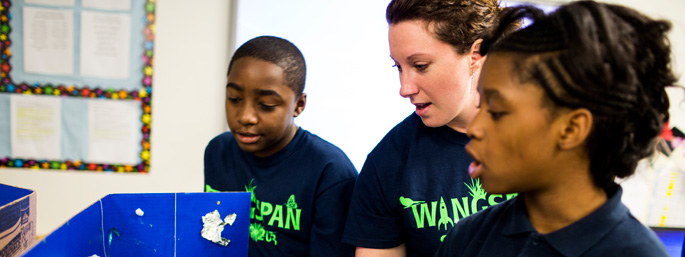Over the weekend, two articles came out that highlight important questions facing institutions that train future teachers: how do you emphasize the skills they need most, and how do you make sure they are ready to prepare their students to meet the higher expectations of the Common Core standards? Both pieces focus on issues that TNTP and others have been working on for several years now.
In the New York Times, Joe Nocera interviewed three teachers—each with different paths to the classroom—who all agreed that their teacher preparation programs failed to provide them with enough opportunities to practice even the most basic elements of their work, like classroom management and lesson planning. It echoes a major critique from the NCTQ Teacher Prep Review earlier this year, and TNTP heard the same thing when we polled excellent teachers earlier this year. Nocera then rightly asks: why don’t teacher training programs focus on skills rather than theory?
In our Teaching Fellows programs around the country, we’ve recently made that shift. As Karolyn wrote earlier this month, we’ve reworked our entire approach to training, focusing on the skills that will prepare teachers to establish a culture for student success on Day 1. Today, our Fellows spend their pre-service training time practicing the skills we believe serve as the foundation for a long and successful career. They also receive intensive, hands-on coaching during training and throughout the school year to help them perfect and build on those skills. It’s still early, but we’ve already seen some great results.
Do we think more programs should take this approach? Absolutely—and if states and districts start demanding more effective new teachers, we’re confident they will over time, to the benefit of all students.
Meanwhile, Sarah Carr and Danielle Dreilinger of The Hechinger Report surveyed teacher preparation programs in Louisiana to see how they are incorporating the Common Core standards into their curricula. It’s a timely topic: as we learn more about how students measure up to the Common Core standards, as we did in New York this summer, it is more important than ever that teachers are prepared to help students meet this higher bar for proficiency.
On top of knowing where we are in Louisiana today, it would be beneficial to learn where programs should be tomorrow. To that end, I’d love to read about Common Core integration in the best programs in Louisiana, to publicize the lessons from which others might benefit.
Louisiana is one of the few states where this is possible: the state keeps and publishes data on how the graduates of all teacher prep programs in the state perform once they are in the classroom. Some places to look for best practices: Southeastern University’s alternative certification program (not just their undergrad programs), alternative certification programs at Louisiana College and our own teachNOLA and TNTP Academy programs, which have earned some of the highest effectiveness ratings in the state for five years straight.
More articles on this topic need to be written. Lots of folks will be paying attention, since this is an issue that has the potential to bring together a wide group of otherwise strange bedfellows in the education policy space. No matter where you stand on other issues, nearly everyone agrees we should do more to help new teachers prepare for one of the hardest and most important jobs on the planet.








